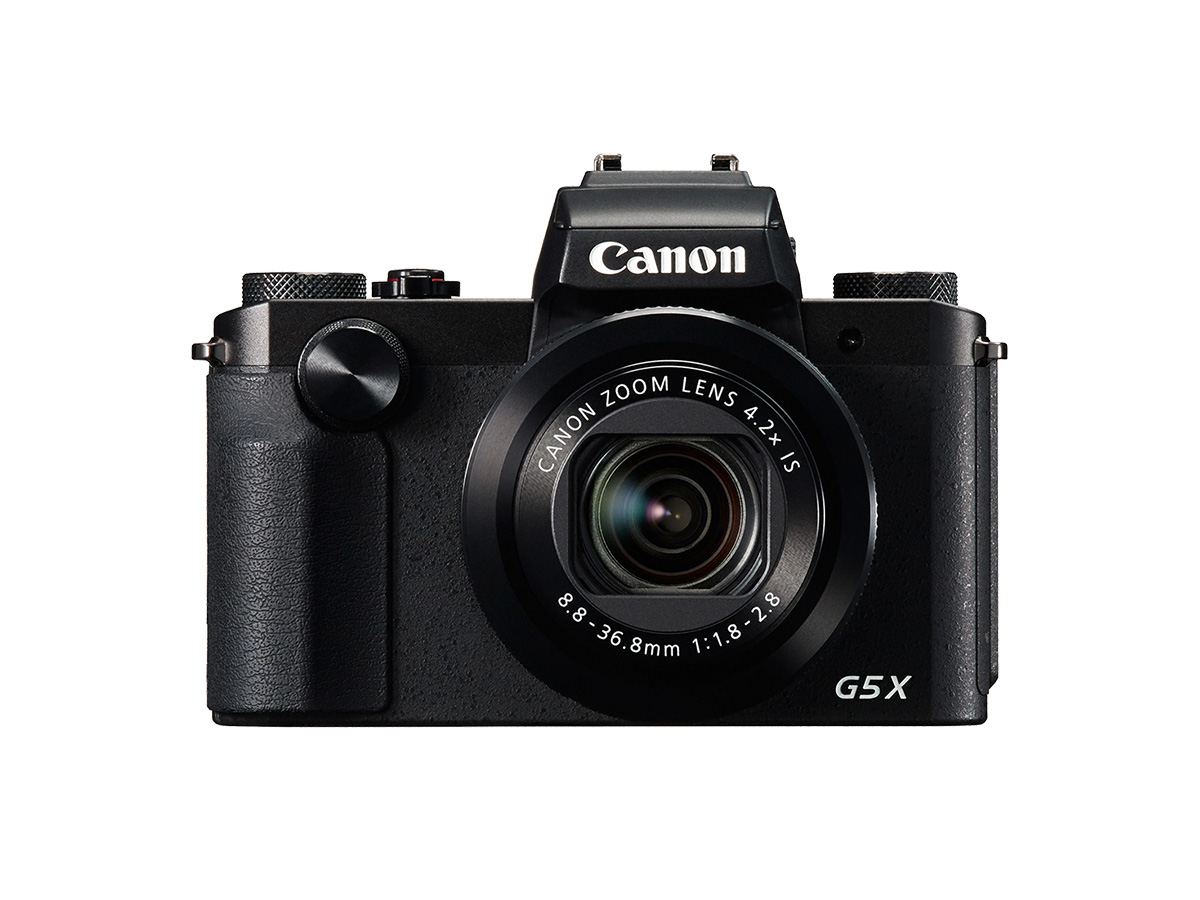You can check the shooting screen and shoot remotely using your smartphone.
Caution
In the following explanation, smartphone setting procedures are indicated by the

icon, and camera setting procedures are indicated by the

icon.
When performing remote shooting, shooting modes other than [ P ], [ Tv ], [ Av ], [ M ], [ C ] cannot be selected.
Movie recording is not possible.
For convenience, iPhones, and iPads, are collectively referred to as "smartphones".
In camera settings, the smartphone must be allowed to view camera images.
In order to use a smartphone to control the camera remotely, the Camera Connect application must be installed on the smartphone.
Caution
Keep your fingers or other objects off the Wi-Fi antenna area. Covering this may decrease the speed of your image transfers.
Connections require that a memory card be in the camera.
On the screen, wireless signal strength is indicated by the following icons.
-[  ] high, [
] high, [  ] medium, [
] medium, [  ] low, [
] low, [  ] weak
] weak
The procedure for using a smartphone to control the camera during remote shooting via Wi-Fi is explained in the following four steps. Proceed in order from Step 1.
 Step 1: Confirming the OS version
Step 1: Confirming the OS version
 Step 2: Installing Camera Connect on the smartphone
Step 2: Installing Camera Connect on the smartphone
 Step 3: Connecting the camera to the smartphone
Step 3: Connecting the camera to the smartphone
 Step 4: Using the smartphone to control the camera during remote shooting
Step 4: Using the smartphone to control the camera during remote shooting
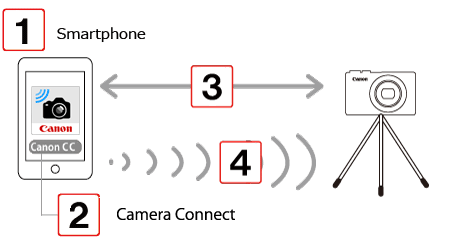
Step 1: Confirming the OS version
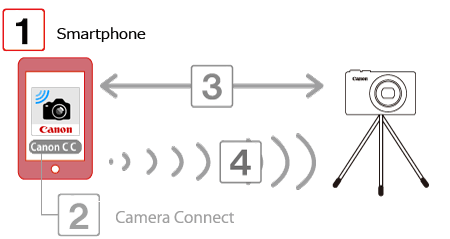
 1. Check the smartphone’s specifications.
1. Check the smartphone’s specifications.
To check the iOS version information, touch [Settings]

[General]

[About].
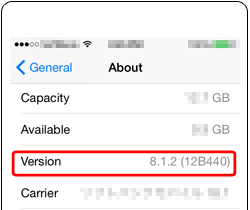
Caution
Please refer to the related information for details on the smartphones which can be connected with a camera wirelessly.
Step 2: Installing Camera Connect on the smartphone
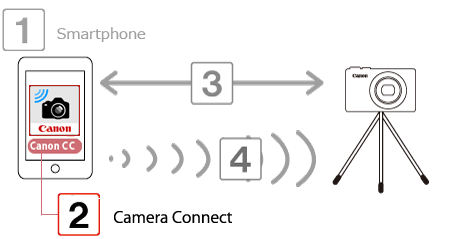
Caution
The example procedure is shown on an iPhone installed with iOS 8.1.
The example screen images from the smartphone are used to explain the setting procedures and may differ from the screens shown in other iOS versions.
Interface or functions of Camera Connect are subject to change, for application improvement or update. In such a case, features of Camera Connect may differ from sample screens or operation instructions in this explanation.
 1. Touch the [App Store] application on your smartphone to access the App Store.
1. Touch the [App Store] application on your smartphone to access the App Store.
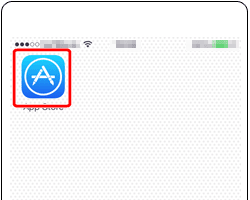
Caution
The Camera Connect application is free, but separate connection charges for accessing the App Store may be applicable.
An Apple account is necessary to download Camera Connect.
Downloading Camera Connect using a cellular network may take longer than downloading via Wi-Fi.
 2. Touch the search icon.
2. Touch the search icon.
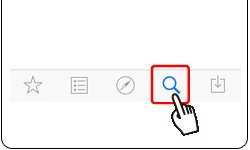
 4. Choose [Camera Connect] from the displayed search results, and install it on the smartphone.
4. Choose [Camera Connect] from the displayed search results, and install it on the smartphone.
After installation has been completed, tap the [Home] button to return to the Home Screen.
Step 3: Connecting the camera to the smartphone
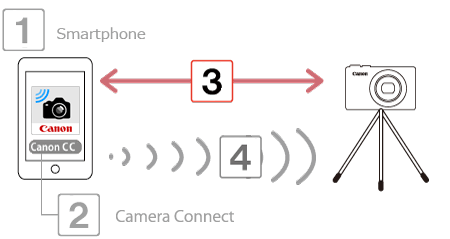
 1. Touch [Settings].
1. Touch [Settings].
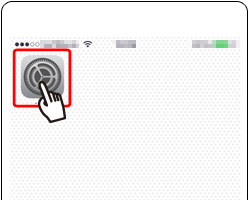
 2. Confirm the smartphone's settings.
2. Confirm the smartphone's settings.
 : Make sure that [Airplane mode] is not set.
: Make sure that [Airplane mode] is not set.
 : Touch [Wi-Fi].
: Touch [Wi-Fi].
 : Set the [Wi-Fi] switch to [ON].
: Set the [Wi-Fi] switch to [ON].
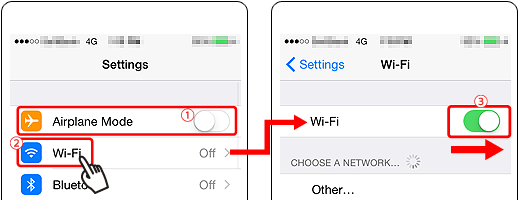
 3. Select the shooting mode.
3. Select the shooting mode.
Set the mode dial to [ P ], [ Tv ], [ Av ], [ M ], or [ C ].
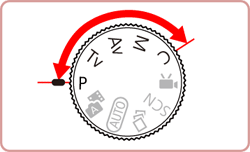
Caution
It is not possible to change the shooting mode after remote shooting begins.
If the camera is set to a shooting mode other than [ P ], [ Tv ], [ Av ], [ M ], or [ C ], the shooting mode will automatically be changed to [P] mode during remote shooting. However, some Quick Set menu and MENU settings you have configured in advance may be changed automatically.
 4. Secure the camera.
4. Secure the camera.
・Once remote shooting begins, the camera lens will come out. Lens motion from zooming may also move the camera out of position. Keep the camera still by mounting it on a tripod or taking other measures.
 5. Press the camera’s [ Mobile device connect ] (
5. Press the camera’s [ Mobile device connect ] ( ) button.
) button.
(Hereafter referred to as the ⋖ ⋗ button.)
⋗ button.)
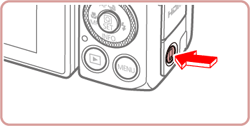
Caution
When setting up Wi-Fi for the first time, the camera nickname registration screen will be displayed.
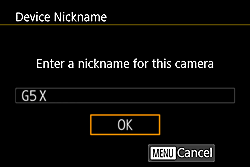
This nickname will be displayed on [Select a Device] screen when connecting to other devices via Wi-Fi.
If the [Device Nickname] screen is displayed, press the ⋖

⋗⋖

⋗ buttons to choose [OK], and then press the ⋖

⋗ button. (The camera model name (G5 X) is set as the nickname by default.)
To change the camera’s nickname, press the ⋖

⋗⋖

⋗ buttons to choose the [Nickname] field, press the ⋖

⋗ button to display the keyboard, and then enter the desired nickname. After you have finished entering the nickname, press the ⋖MENU⋗ button to return to the registration screen, press the ⋖

⋗ button, choose [OK], and then press the ⋖

⋗ button.
 7. The camera’s SSID is displayed on the screen.
7. The camera’s SSID is displayed on the screen.
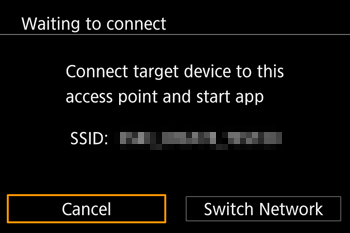
Caution
When you are in the vicinity of an access point that you have previously connected to, the camera will automatically connect to it.
To change access points, select [Switch Network] from the screen that will be displayed when the connection is being established.
After confirming that the smartphone and the camera are connected, touch the [Home Button] to return to the [Home Screen].
After the camera recognizes the smartphone, a device selection screen is displayed.
 11. After a connection is established with the smartphone, the smartphone’s name is displayed on the camera. (This screen will close in about one minute.)
11. After a connection is established with the smartphone, the smartphone’s name is displayed on the camera. (This screen will close in about one minute.)
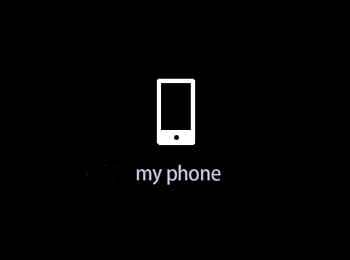
 12. Touch [Images on camera ] in Camera Connect.
12. Touch [Images on camera ] in Camera Connect.
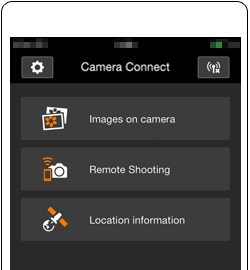
Caution
Once you have connected to a smartphone initially via Wi-Fi by pressing the ⋖

⋗ (Mobile device connection) button, you can simply press the ⋖

⋗ (Mobile device connection) button after that to connect again for viewing and saving camera images on connected devices.
One smartphone can be registered to the ⋖

⋗ (Mobile device connection) button.
Once a connection has been established with a smartphone, you can automatically reconnect to the registered device by simply pressing the ⋖

⋗ button, even if the camera has been turned off.
Caution
To clear smartphones registered to the camera, display the menu screen, press the ⋖

⋗⋖

⋗ buttons to choose the

[Mobile Device Connect Button] on the [

] tab, and then press the ⋖

⋗ button. Press the ⋖

⋗⋖

⋗ buttons to choose

[OK] on the confirmation screen, and then press the ⋖

⋗ button to complete the process.

If you wish to register a different smartphone to the ⋖ ⋗ button, clear the one currently registered first.
⋗ button, clear the one currently registered first.
Step 4: Using the smartphone to control the camera during remote shooting
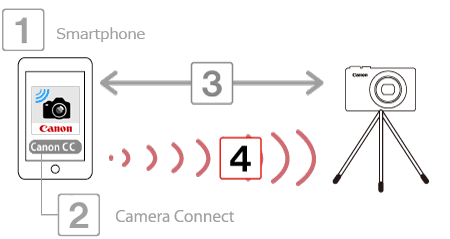
 1. In Camera Connect on the smartphone, choose [Remote shooting].
1. In Camera Connect on the smartphone, choose [Remote shooting].
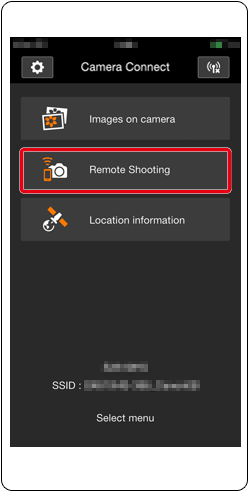
Caution
The camera lens will come out. Do not press near the lens, and make sure no objects will obstruct it.
 2. Once the camera is ready for remote shooting, a live image from the camera will be displayed on the smartphone. At this time, a message is displayed on the camera, and all operations except pressing the power button are disabled.
2. Once the camera is ready for remote shooting, a live image from the camera will be displayed on the smartphone. At this time, a message is displayed on the camera, and all operations except pressing the power button are disabled.
 3. Use the smartphone to control the camera. Press the
3. Use the smartphone to control the camera. Press the  button to shoot.
button to shoot.
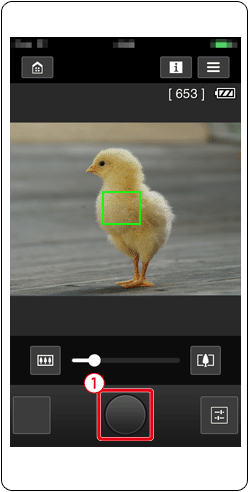
Caution
Any jerky subject motion shown on the smartphone due to the connection environment will not affect recorded images.
Captured images are not transferred to the smartphone. Use the smartphone to browse and import images from the camera.
 icon, and camera setting procedures are indicated by the
icon, and camera setting procedures are indicated by the  icon.
icon.










 [General]
[General]  [About].
[About].








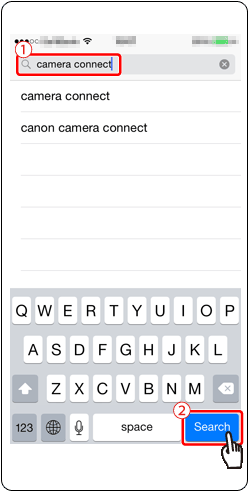

















 ⋗⋖
⋗⋖ ⋗ buttons to choose [OK], and then press the ⋖
⋗ buttons to choose [OK], and then press the ⋖ ⋗ button. (The camera model name (G5 X) is set as the nickname by default.)
⋗ button. (The camera model name (G5 X) is set as the nickname by default.)  ⋗⋖
⋗⋖ ⋗ buttons to choose the [Nickname] field, press the ⋖
⋗ buttons to choose the [Nickname] field, press the ⋖ ⋗ button to display the keyboard, and then enter the desired nickname. After you have finished entering the nickname, press the ⋖MENU⋗ button to return to the registration screen, press the ⋖
⋗ button to display the keyboard, and then enter the desired nickname. After you have finished entering the nickname, press the ⋖MENU⋗ button to return to the registration screen, press the ⋖ ⋗ button, choose [OK], and then press the ⋖
⋗ button, choose [OK], and then press the ⋖ ⋗ button.
⋗ button.




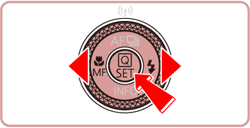
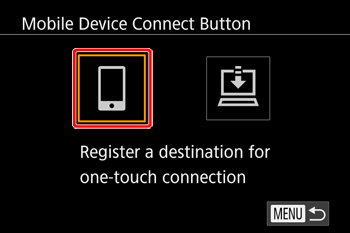



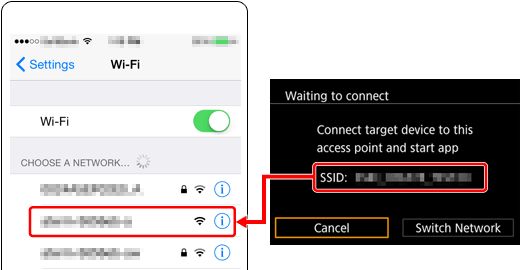




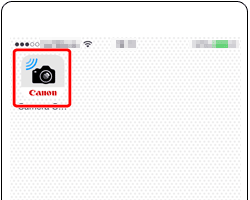





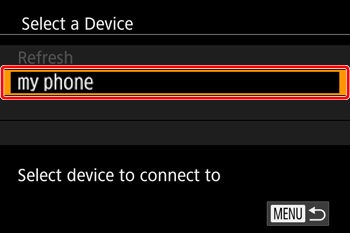




 ⋗ (Mobile device connection) button, you can simply press the ⋖
⋗ (Mobile device connection) button, you can simply press the ⋖ ⋗ (Mobile device connection) button after that to connect again for viewing and saving camera images on connected devices.
⋗ (Mobile device connection) button after that to connect again for viewing and saving camera images on connected devices. ⋗ (Mobile device connection) button.
⋗ (Mobile device connection) button.  ⋗ button, even if the camera has been turned off.
⋗ button, even if the camera has been turned off. ⋗⋖
⋗⋖ ⋗ buttons to choose the
⋗ buttons to choose the  [Mobile Device Connect Button] on the [
[Mobile Device Connect Button] on the [  ] tab, and then press the ⋖
] tab, and then press the ⋖ ⋗ button. Press the ⋖
⋗ button. Press the ⋖ ⋗⋖
⋗⋖ ⋗ buttons to choose
⋗ buttons to choose  [OK] on the confirmation screen, and then press the ⋖
[OK] on the confirmation screen, and then press the ⋖ ⋗ button to complete the process.
⋗ button to complete the process.














